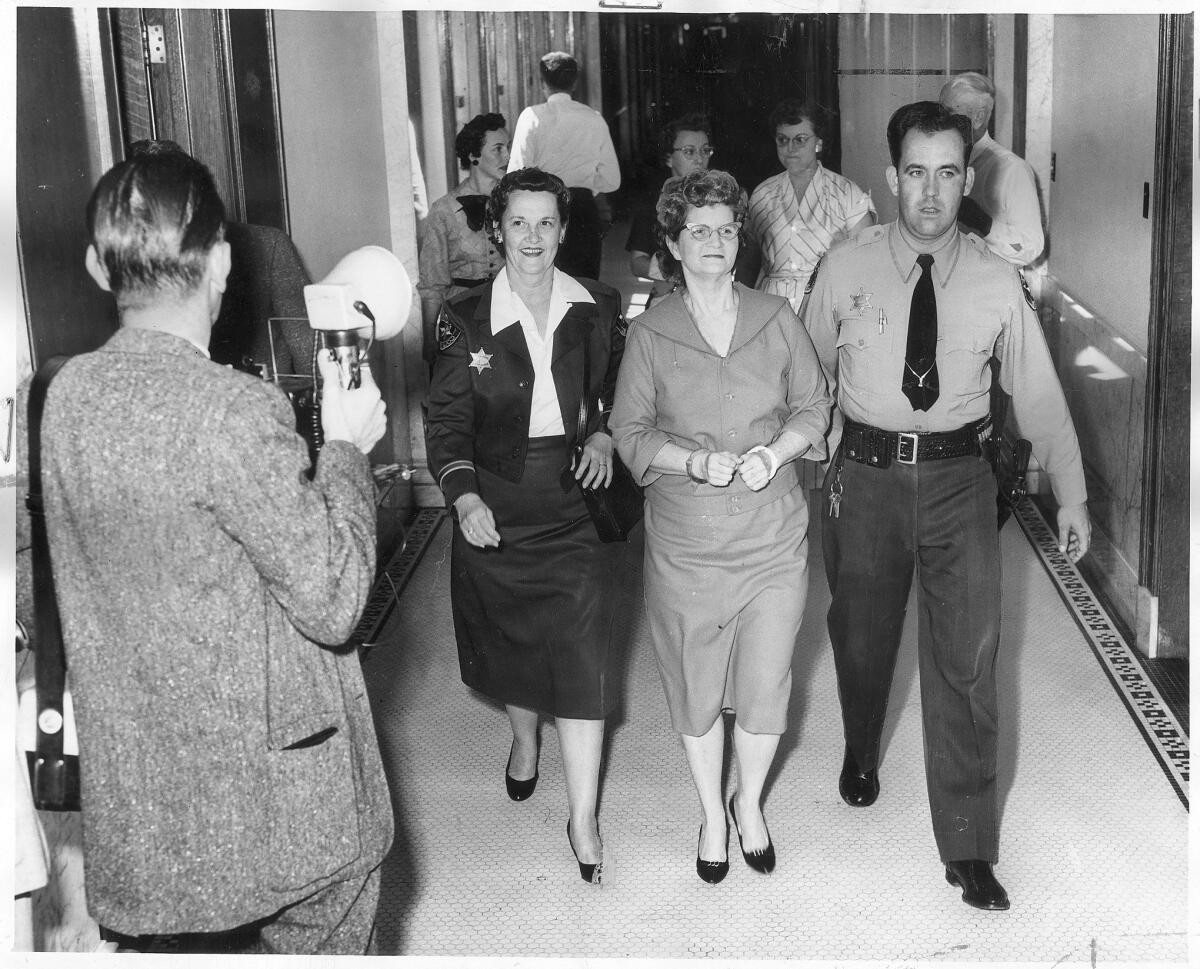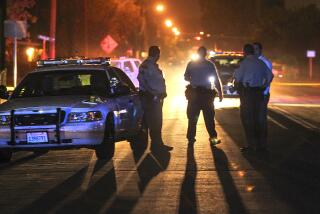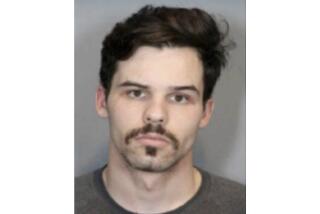A Mother’s Love Was the Death of Her Daughter-in-Law

A March 17, 1959 file photo of Elizabeth Ann Duncan accompanied by Dep. Jeff Boyd, wearing a faint smile as she goes back to her cell to await the verdict to the jury.
The worst mother-in-law in California was also the last woman to be executed in the state, in 1962.
Elizabeth Ann “Ma” Duncan was 58. She had stalked and finally ordered the death of her pregnant daughter-in-law in an example of mother love gone wrong.
Only four women have been executed in California since 1893; the records are unclear whether any were put to death by local agencies before then. All four were convicted murderers.
The first woman to die in San Quentin’s gas chamber was Juanita Spinelli, in 1941. Known as “The Duchess,” she led a San Francisco crime gang. Spinelli was convicted of killing a gang member to prevent him from squealing about a murder.
Six years later, Louise Peete was sent to the gas chamber for robbing and killing a woman who had befriended her while she was in prison. In the 1920s, Peete had killed her employer, who was also her lover.
And Barbara Graham, an attractive “gun moll,” was convicted, along with two accomplices, of strangling and beating to death a wealthy disabled Burbank widow. Her execution--seven years before Ma Duncan’s--was graphically and sympathetically depicted in the 1958 Oscar-winning Susan Hayward film “I Want to Live.”
Ma Duncan’s 1959 trial focused a harsh spotlight on Ventura County, where the prosecution painted a grim portrait of an overbearing, obsessed and terrifying mother, consumed with an intense hatred for her pregnant daughter-in-law and a perverse love for her son--so much that she resorted to murder to separate him from his wife.
Before she hired two thugs to murder the wife, Ma Duncan had tried to break up their marriage by impersonating her daughter-in-law at an annulment hearing and paying a stranger to pose as her son.
The trial was just as bizarre as the crime. Ma Duncan’s son, Frank Patrick Duncan, a Santa Barbara attorney whom she always called “mama’s little boy,” didn’t appear to hold a grudge; he even helped to defend his mother at trial.
It was also the first time Ventura County Dist. Atty. Roy Gustafson prosecuted a capital murder case under a state law he wrote that created a separate penalty phase of the trial.
In 1948, Ma Duncan was living in Long Beach with the youngest of her six children, Patsy Ann, 15. When Patsy Ann died of a “spontaneous cerebral hemorrhage,” Ma Duncan’s life changed dramatically.
Over the next decade, she drifted in and out of 10 or 20 marriages, in some cases not bothering to divorce one man before marrying another. She wrote bad checks, used false names and once served 30 days in jail in San Francisco for running a brothel. She lured several husbands on the false promise of money coming her way, and she once lied about her age to another husband--one of her son’s law school classmates--even promising that she would give him a baby.
In November 1957, Ma Duncan moved in with her favorite child, Frank, who lived in Santa Barbara. He tried to sort out her marital tangles, but when she refused to cooperate, he ordered her to move out.
Instead, she took an overdose of sleeping pills. While she was recuperating, Frank got to know her nurse, 30-year-old Canadian-born Olga Kupczyk.
As the two dated and fell in love, Ma Duncan’s health returned and her wrath grew. She was possessive and didn’t want anyone interfering in Frank’s life or career, or coming between her and “mama’s little boy.”
In June 1958, Frank and Olga were married. When Frank told his mother, she became hysterical. “There was uncontrollable weeping and she begged me to return home,” Frank later testified. “I felt like a yo-yo, bouncing back and forth between both women.”
To keep the peace, Frank visited his wife in her own apartment every night, but went home to sleep at the apartment he shared with his mother. Still, Olga soon was pregnant.
After Frank left for work each morning, his mother telephoned Olga or went to her apartment to threaten the woman, hoping to scare her out of town. When that failed, she bought a gun and threatened to kill herself in front of her son. He took the gun away.
Olga feared for her life and that of her unborn baby. She told her girlfriends and wrote to her parents about her fears. She moved from apartment to apartment to keep away from Ma Duncan. But when she told Frank about his mother’s threats, he refused to believe it; his mother told him it wasn’t true.
When the harassment and threats didn’t work, Ma Duncan began to offer money to friends to help her kill Olga. Among them was a carhop to whom she offered $1,500 to throw acid in Olga’s face and then push her off a cliff. The waitress told Frank, but when he again confronted his mother, she again denied it.
No one went to the police.
Through a friend, Ma Duncan found two men, Luis Moya and Augustine Baldonado, and they reached a price: $3,000 for the job.
She pawned some jewelry for $175, stole $200 from her son’s wallet, kept a few bucks for herself and gave them a down payment of $335.
On Nov. 18, 1958, Moya and Baldonado borrowed a car and a gun and lured Olga from her apartment on the pretext that her husband was drunk in the back seat of their car. She was still in her bathrobe and slippers when they shoved her inside the car. She fought back, kicking and scratching. The men panicked and pistol-whipped her so hard that they broke the borrowed gun.
They beat her again, choked her and dumped her body in a shallow grave they dug in a culvert at the Casitas Dam construction site near Ojai. No one knows whether she was dead or alive when they buried her.
Weeks later, both men were arrested on unrelated charges. Ma Duncan, fearing the men would spill their murderous secret, told her son that they had been blackmailing her about the annulment she tried to stage. Her son went to police, intending to get the men in more legal trouble.
But it didn’t work out that way. Police soon became suspicious about Olga’s disappearance and pressed the men, who confessed and implicated Ma Duncan. They would later say that if they had known Olga was pregnant, they would not have killed her.
Ventura County was horrified--a mother-in-law accused of killing her son’s wife and her own unborn grandchild. The courtroom was crowded from Day One.
Frank Duncan defended his mother, joined by Los Angeles attorney S. Ward Sullivan. Five years earlier, Sullivan had lost the case defending Jack Santo and Emmett Perkins, the accomplices of good-time girl Barbara Graham. Along with Graham, they were sentenced to death.
At the attorneys’ table and on the witness stand, Frank was not the picture of a grief-stricken husband. Although he testified that his relationship with his wife was one of “love and affection,” he also admitted that he had never so much as talked to her in the 10 days before her disappearance.
When asked if his mother tried to break up his marriage, he replied, “Let’s just say she hindered its development.”
Despite the prosecution’s 44 witnesses, including the hit men, Ma Duncan steadfastly denied any knowledge of the crime. Four weeks after the trial began, Ma Duncan was convicted of first-degree murder and sentenced to be executed.
Moya and Baldonado, who had already confessed and been sentenced to death, tried to flee by sawing through their cell bars with smuggled hacksaw blades. They beat two guards and held them hostage until tear gas quelled their escape attempt.
After three years of appeals, Ma Duncan walked into the gas chamber with poise and dignity--head held high, her face betraying no emotion--but without her trademark horn-rimmed glasses. Unlike Graham, Duncan did not ask for a blindfold. But earlier, when she had asked to be sedated, officials had refused.
Before the gas enveloped her, she said, “Where’s Frank? I am innocent.” Frank wasn’t there; he was working on getting his mother’s execution delayed. It was Aug. 8, 1962.
Like Graham, Duncan was a woman executed with two accomplices. She died first, and alone. Three hours later, her accomplices laughed and talked as they strolled into the gas chamber, where they took their seats, side by side.
“It’s down!” yelled Baldonado of the cyanide pellets; he was loud enough to be heard through the glass partition.
“I can smell it. It doesn’t smell good,” Baldonado added.
While his mother was in prison, Frank Duncan remarried, this time to an attorney (whom he divorced some years later).
After his mother’s execution, he moved to Los Angeles, where he practiced law and never again made headlines.
Twelve women are now on death row in California.
To read the article in Spanish, click here
More to Read
Start your day right
Sign up for Essential California for news, features and recommendations from the L.A. Times and beyond in your inbox six days a week.
You may occasionally receive promotional content from the Los Angeles Times.






